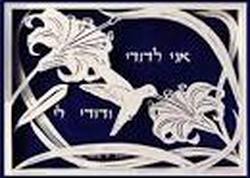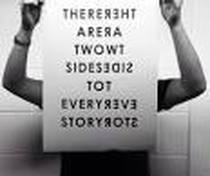 It's Adar, and I just can't resist including this well known, but still funny tale. I dedicate it not only to my Rebbe, but to my daughter Kaziah as well, a member of the Mt. Holyoke varsity equestrian team. Marbim b'simcha everyone! If you've got a good one for Adar, please pass it on below in the comments section. This is a story about a Jewish guy who buys a horse. The fellow who sells it to him tells him, "This horse is different than other horses – it is trained to start moving when you say “Baruch Hashem” (Thank G!d), and he's trained to stop only when you say “Shma Yisrael” (Hear Oh Israel)
The new owner is all excited with his new purchase and gets on the horse and practices. “Baruch Hashem” he says, and the horse breaks into a trot. The man is delighted, and a few moments later calls out “Shma Yisrael”, and sure enough, the horse stops. "Wow, this is great", the man laughs, "it's a Jewish horse!" And so it was that some days later, while galloping on his horse through the forest and having the time of his life, he sees in the distance that the path ahead ends at a steep cliff. His heart begins to race, when suddenly he realizes that he has forgotten the two-word formula needed to make the horse stop! "It's a well known expression", he says to himself. "What is it, what is it?" In confusion he shouts, "Shabbat shalom!" The horse keeps going. "Adon Olam!" he cries out. The horse keeps going, faster still to the abyss. In near desparation he wails “B'vak'asha!”. But the horse keeps galloping. Realizing that he is about to die, he does what any Jew would do when confronted with certain death. He screams out, “Shma Yisrael!”. And as trained, the horse stops suddenly – barely a foot from the edge of the cliff. Shaking like a leaf, he pulls out his handkerchief and wipes the sweat from his forehead. “Whew" he exhales, "Baruch Hashem!" ************ Please consider offering a tax deductible donation to support this project and the work of DC's Jewish Renewal community Minyan Oneg Shabbat. If you would like to be added to the growing list of "Year of Stories" followers, let me know at [email protected], with "Year of Stories" in the subject line.
2 Comments
 My friend and colleague R' Leila Gal Berner shared this sweet story with me. R' Zalman tz"l brought so much joy to so many of us, what more fitting way to enter into the month of Adar. מרבים בשמחה Marbim B'simcha! May Our Joy Increase! When I was a student at the Reconstructionist Rabbinical College, I had the honor of spending a fair amount of time learning with Reb Zalman at the P’nai Or house on Emlen Street. During that time, Zalman and I would take walks in the neighborhood. Since Mt. Airy is an old neighborhood, the sidewalks were very uneven and it was always necessary to look down when walking in order not to trip and fall flat on one’s face. Simply strolling was impossible.
One day, walking and gazing down at the sidewalk carefully, Reb Zalman spotted a centipede. Bending down, he gently scooped the centipede up and placed it on his arm. As it undulated up and down Zalman’s arm, my rebbe spoke quietly, “Baruch HaShem, Leila leybn, that we can gain such wisdom from this little creature! Look at its many legs. You know, we are like the centipede. We each walk on hundreds of feet and it is only somewhere in our lives that we discover our genuine two feet. All the others feel inauthentic, unreal, like marshmallows, like pillows. We don’t really feel anything beneath our feet and we aren’t really connected to the vitality of the earth beneath them. But when we discover our ‘real’ feet, we begin to feel deeply connected to holy ground, just as Moshe Rabbeinu felt before the burning bush. With our real feet, we feel heat and cold, and pain. We feel softness and harshness, and sharpness — we feel Life! Make sure, Leila leybn, that you find your authentic feet and walk honestly and humbly on them. Years later, I reminded Reb Zalman of his words about the centipede. My rebbe smiled and simply asked me, “So, nu, have you found your feet yet?” When I answered that I thought so, he laughed and said, “Baruch HaShem.” Thank you Leila for sharing this with us. If you have a story or comment to share, please do so by clicking on the Comments section below ************ Please consider offering a tax deductible donation to support this project and the work of DC's Jewish Renewal community Minyan Oneg Shabbat. If you would like to be added to the growing list of "Year of Stories" followers, let me know at [email protected], with "Year of Stories" in the subject line.  I served as shaliach tzibbur this morning at Tiferet Israel in northwest DC. In my usual playful manner of acknowledging (nearly) all things, I overlaid the love song • L-O-V-E • while I chanted the paragraph that begins with Kulam Ahuvim, all are beloved. Much to my delight, this being Valentine's Day, the drash given by TI member Iris Lav was dedicated to love, especially of the romantic kind, not a frequent topic for the either the Torah or for Chazal. Iris presented three stories, two from the Talmud and the other from the commentary to Shir haShirim, the Song of Songs. I plan to use all of these stories in my meeting tomorrow with a lovely couple who are getting married in June. All three stories are worth mining for their deeper meaning. I'd love (pun intended) to hear your take on any of the stories. So if that is your desire (what, another pun?) please comment below. I added Hebrew below in places where there is a likely play on words. • From Babylonian Talmud Bavli 62b Rav Rehumi (רב רחומי) used to learn in Rava's yeshiva in the town of Mahoza. He was accustomed to coming home every Yom Kippur eve. One day he lost himself in his learning. His wife was awaiting him: "Now he's coming, now he's coming,"she thought. He did not come. She grew weak. She let a tear (אחית) fall from her eye. At that moment Rav Rehumi was sitting on the roof. The roof collapsed (אפחית) underneath him. And he fell to his death. (Go back and re-read A Year of Stories #30. Are these two stories related in their underlying message?) Translation from Ruth Calderon, A Bride for One Night • from Shir haShirim Rabah 1:31 (In Babylon) it was taught: If a man has taken a wife and lived with her for ten years, but she has not borne a child, he is nonetheless obligated (to "be fruitful and multiply," and therefore to marry another woman.) R' Idi said: The story is told of a woman from Sidon who lived with her husband for ten years and did not have children. They came before R' Shimon ben Yochai and asked to be divorced from one another. He said to them: "Look here, as you married each other with food and drink, so too may you separate only with food and drink." They went on their way, and made a holiday for themselves. They made a great feast, and she got him too drunk. This brought him back to his senses, and he said to her: "My beloved, if you see anything that you want in my house... ראי כל חפץ טוב שיש לי בבית ...take it and go to your father's." What did she do? After he fell asleep, she called to her servants, saying, "Carry him in his bed to my father's house." At midnight, when the effects of the wine had worn off, he awoke, and said to her,"My beloved, where am I?" She said to him: "In my father's house." He said to her: "What am I doing in your father's house?" She said to him: "Is that not what you said to me last evening, "anything you desire in my house take it and go to your father's house"? There is nothing I desire more in the world than you!" אין חפץ טוב לי בעולם יותר ממך They went before R' Shimon ben Yochai, and he stood and prayed over them, and they had children. (Translation from Ido Hevroni, Midrash As Marriage Guide • Babylonian Talmud Nedarim 66b A son of Babylon went to the land of Israel and took a wife. He said to her: "Cook me a couple of lentils." She cooked him two lentils. He was angry with her. The next day, he said to her, "Cook me a se'ah of lentils (approximately 14 liters). She cooked him a se'ah of lentils. He said to her: Go and bring me two botzinei (can mean either pumpkins or oil lamps) She brought him two oil lamps. He said to her: "Go and break them against the head of the baba (gate) Baba ben Buta was sitting at the city gate and giving judgment. She went and broke them on his head, He said to her, "What have you done?" She said to him, "What my husband bade me to do." He said, "Because you did your husband's bidding, G!d will give you two sons like Baba ben Buta." (translation from Ido Hevroni, The Midrash as Marriage Guide) ************ Please consider offering a tax deductible donation to support this project and the work of DC's Jewish Renewal community Minyan Oneg Shabbat. If you would like to be added to the growing list of "Year of Stories" followers, let me know at [email protected], with "Year of Stories" in the subject line.  When Rabbi DovBer of Lubavitch was a young man, he lived in the same house as his father, Rabbi Schneur Zalman. R’ DovBer and his family lived in the ground floor apartment, and his father R’ Schneur Zalman and mother Sterna lived on the second floor. One night, while R’ DovBer was deeply engrossed in meditation, his youngest child fell out of his cradle. R’ DovBer heard nothing. But his father, R’ Schneur Zalman, who was also immersed in study in his room on the second floor, heard the infant's cries. The Rebbe came downstairs, lifted the infant from the floor, soothed his tears, replaced him in the cradle, and rocked him to sleep. The father said to his son, “ if you are studying so intensely that you can’t hear your own child crying, than you are not meditating.” ************* Adapted by R' Mark Novak, from versions told by R’ David Ingber in a drash on Parshat Mishpatim (here) and R' Yanki Tauber. Rabbi Tauber's version extracts further meaning from Deuteronomy 22:1-3, which ends with the words לא תוכל להתעלם (lo tu'chal l'hit'a'leym) you must not hide yourself. ************ Please consider offering a tax deductible donation to support this project and the work of DC's Jewish Renewal community Minyan Oneg Shabbat. If you would like to be added to the growing list of "Year of Stories" followers, let me know at [email protected], with "Year of Stories" in the subject line.  And here are two Sufi stories to demonstrate just that The Sun & The Cave One day the sun and a cave struck up a conversation. The sun had trouble understanding what “dark” and “dank” meant and the cave didn’t quite get the hang of “light and clear” so they decided to change places. The cave went up to the sun and said, “Ah, I see, this is beyond wonderful. Now come down and see where I have been living.” The sun went down to the cave and said, “Gee, I don’t see any difference.” The Dream A visitor came to a Chishti pir. This visitor wanted to demonstrate his own knowledge of the Qur’an and intended to overpower the Chishti pir in a debate. When he entered, the Chishti pir took the initiative however and mentioned Yusuf and the dreams he has had according to the Qur’an. He then suddenly turned to his visitor and asked him if he could tell him about a dream, so that the visitor may give his interpretation thereof. After receiving permission the Sufi told that he has had a dream and both of them were in it. The Chishti pir then went on by describing the following dream event: “I saw your hand immersed in a jar of honey, while my hand was immersed in the latrine”. The visitor hastened to interpret: “It is quite obvious! You are immersed in wrong pursuits whereas I am leading a righteous life”. “But’, the Sufi said, “there is more to the dream”. The visitor asked him to continue. The Chishti pir then went on by telling this: “You were licking my hand and I was licking yours”. ********************* I found both these stories at http://theunboundedspirit.com/10-sufi-stories/#sthash.fmZpj63J.dpuf ********************* Please consider offering a tax deductible donation to support this project and the work of DC's Jewish Renewal community Minyan Oneg Shabbat. If you would like to be added to the growing list of "Year of Stories" followers, let me know at [email protected], with "Year of Stories" in the subject line. |
Mark Novak is a "free-range" rabbi who lives in Washington DC and works, well, just about everywhere. In 2012 he founded Minyan Oneg Shabbat, home to MOSH (Minyan Oneg Shabbat), MindfulMOSH (Jewish mindfulness gathering), and Archives
June 2017
Categories
All
|
 RSS Feed
RSS Feed
